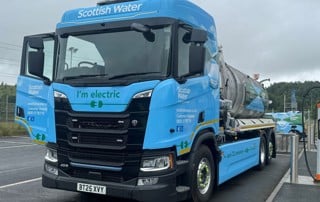By Alok Dubey, regional director for Western Europe at Monta
Fleet managers face significant complexity in 2024 as they look to decarbonise their fleets.
Fortune favours the brave and many studies show the benefits of transitioning fleet vehicles to include more electric vehicles (EVs).
The catalyst for many commercial fleets to switch to zero-emission mobility relies on robust workplace and depot charging infrastructure. This will provide fleet operators with the confidence and conviction to invest in a ‘greener fleet’.
This means undertaking a comprehensive feasibility assessment, evaluating the localised grid capacity and consumption while ensuring the intended location is viable with the supply headroom required.
Maximising the investment
Fleet operators are in a prime position to benefit from their investment in charging infrastructure by opening up their network for public use, they can create additional revenue opportunities while also driving the adoption of EVs and expanding charging infrastructure.
This approach strengthens the financial sustainability of fleet operations and supports broader sustainability goals.
Commercialising fleet adoption
Fleet operators can address the growing demand for EV charging stations by implementing ‘charging-to-charge’ programs.
For example, opening their infrastructure to the public during off-peak hours, forming partnerships with businesses, offering incentivised charging, integrating with ride-sharing services, and engaging with the community to promote EV adoption all help to expand the public charging infrastructure.
This proactive approach not only boosts the EV market but also challenges any misconceptions over public charging accessibility, encouraging more people to switch to EVs.
Charging to charge can be an attractive strategy, empowering fleet operators to switch to more sustainable transportation while supporting economic growth and environmental responsibility.
Expanding the UK’s charging infrastructure
The zero emission vehicle (ZEV) mandate represents a significant stride towards advancing the transition to electric mobility.
This mandate requires manufacturers to progressively increase the proportion of EVs sold as part of their total registrations, with annual targets rising. 80% of new cars and 70% of new vans sold in Great Britain will now be zero emission by 2030, increasing to 100% by 2035.
The mandate encourages manufacturers to prioritise the production and sale of EVs and ensures the expansion of different zero-emission vehicles available in the market.
This increased demand acts as a catalyst for both public and private entities to invest in installing more charge points across the country.
Accelerating the opportunity through collaboration
Collaborations between Government agencies, local authorities, and private companies can help streamline the planning, funding, and implementation of charging infrastructure projects.
By pooling resources and expertise, these partnerships can accelerate the deployment of charging infrastructure to meet the growing needs of EV fleets.
As fleet operators recognise the benefits of electrification, they are not only positioning themselves as positive contributors to cleaner air and reduced greenhouse gas emissions but also seizing commercial opportunities and supporting the UK's charging infrastructure development.
The momentum towards EV adoption isn’t slowing down despite what some high-profile naysayers have to say.
With regulatory initiatives like the ZEV Mandate driving the market towards zero-emission mobility and the expansion of charging infrastructure, there is a concerted effort to propel the UK transportation sector to a more sustainable future.
As demand escalates, collaboration between stakeholders becomes paramount. Government agencies, local authorities, and private companies all have an important role to play in the acceleration of the UK's charging infrastructure.
If this happens, the UK will be in a prime position to meet the needs of larger EV fleets, whilst ensuring new commercial opportunities for fleet operators and ensuring the UK’s EV charging infrastructure is fit for purpose.






















Login to comment
Comments
No comments have been made yet.